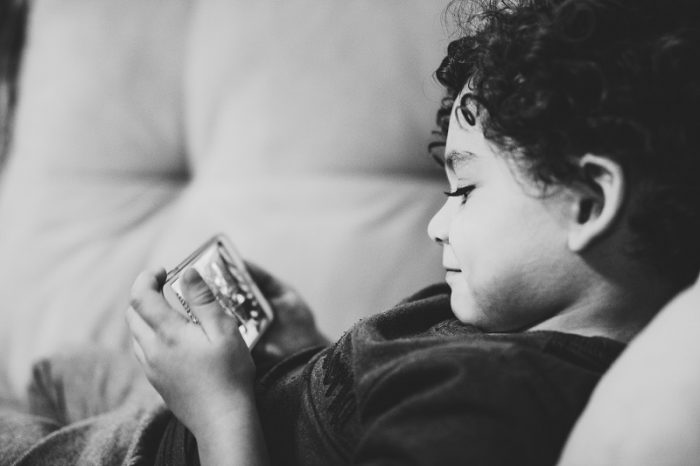We see it all around us: kids mesmerized by their phones.
Whether sitting in groups or alone, kids now average over seven hours of screen time per day. Even though the recommended limit is only two hours per day, many of our children’s lives now revolve around technology. And while technology is known to limit social skills, it also impacts our children’s ability to stay grounded in the real world.
When our priorities include sustainability, equality, diversity, and personal empowerment, translating these values into our parenting style can be challenging. Add in the pull of viral social media posts, trendy Youtubers, and Fortnite, and it’s now almost impossible for kids to stay grounded in this technologically savvy landscape they can’t escape.
But that doesn’t mean there aren’t important and essential things we can do to help our kids grow up to be strong, grounded adults.
Here are a few ideas to help us unplug, recharge, and focus on what’s really important in our kids’ lives:
1. Focus on Imagination over Scripted Play
Ever build a Lego set?
It’s pages and pages of directions on how to build a model. If we don’t get this one block exactly right, the rest of the model may not fit together. It’s not about building our vision—it’s about building someone else’s vision.
And it’s the basic plot of “The Lego Movie.”
Instead of trying to script or lead play, we can provide our children with imaginative toys and arts and craft supplies so they can create whatever they want. Scholastic experts share that we can also:
>> Encourage children to create new adventures for their favorite characters
>> Share different versions of familiar stories
>> Use their imagination to solve real-life challenges
This simple shift from someone else’s story to my story allows our kids to see the possibilities within themselves.
2. Forget about Participation Trophies
We tried to do a good thing. We tried to include all children in creating a fair and equal space for them to learn and grow. Instead, we over-inflated their egos to the point where many kids have become unteachable and uncoachable.
And this is a recipe for disaster.
It’s not that we don’t want to reward effort or that trophies are bad. Instead, we want to teach our kids that failure is okay and life will be challenging (because it always is). In “Teaching Your Child To Be Coachable,” sports camp experts at IMG Academy explain the pitfalls of raising uncoachable kids:
“You’ve probably seen some variation of this post on social media: ‘Un-coachable kids become unemployable adults.’ And, it’s true. A child who is disrespectful, doesn’t take criticism well, and who isn’t willing to learn will take these traits with them into the workforce.”
Encourage kids to play sports and not to quit when the games get tough or coaches criticize their skills. Send them to camps where we let go of our need to keep all negative feedback away from their tiny ears. Have open and honest discussions about how we learn from our mistakes and share how a special coach or teacher helped us overcome adversity.
And remember that a negative comment will probably be harder on us than it is on our strong and resilient children.
3. Incorporate Meditation as a Way of Life
For me, life without meditation is like being adrift in the sea without a compass.
It’s the one constant that keeps me tethered to the divine all around us and connects me with strength when I have none. And while it doesn’t always have to be that deep, it’s the practice of sitting alone with my thoughts—on my terms—that is addicting.
We live in a busy, noisy, and overwhelming world. Meditation helps us decrease anxiety and stress while increasing our inner peace. In “Challenging the Monkey Mind: Meditating with Kids,” Daniel Scharpenburg shares:
“The best way to teach a child to meditate (and an adult, for that matter) is to meditate with them. If they see their parents doing it, they can start to think of it as something that is a good idea to do. Kids often imitate or emulate their parents when they are young.”
We don’t have to make a huge deal about meditation or mindfulness when our kids are young. We don’t have to start with long chakra balancing meditations or try to engage them on deeply spiritual levels. Kids instinctively get it. Give them a few crystals to focus on and they are ready to sit and breathe quietly for short amounts of time.
And it’s a great thing to do together, even for a few minutes per day.
4. Staying Grounded in a World of Chaos
It’s not just technology that separates us from the natural world. It’s our devotion to picture-perfect living and our misguided perception that busy means productive. Yet, if we want to raise strong, grounded children, we must be strong, grounded adults.
Our kids learn from us and what we model. When we stare into a screen all day, it’s not surprising that our kids will do the same thing. When our entertainment, social connection, and self-worth are tied to slivers of technology, our kids will grow up believing that this is normal.
It’s time to get off our phones and practice exactly what we preach.
~












Read 0 comments and reply